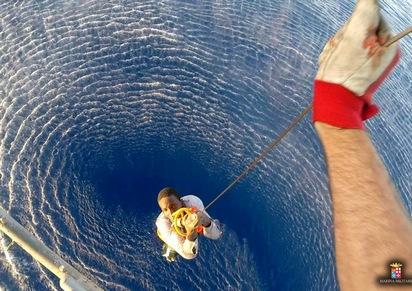Κατά πάσα πιθανότητα, ο περασμένος μήνας θα μείνει στην ιστορία ως ένα σημείο καμπής στο ευρωπαϊκό μεταναστευτικό δράμα. Η Γερμανία, για τους πρόσφυγες από την Συρία έχει ουσιαστικά αναστείλει Δουβλίνο ΙΙ, την Συνθήκη της ΕΕ που υποχρεώνει τους αιτούντες άσυλο να εγγράφονται στην πρώτη ευρωπαϊκή χώρα στην οποία φθάνουν. Εν τω μεταξύ, έχει υποσχεθεί να μην περιορίσει τον αριθμό των προσφύγων που δέχεται, προκαλώντας άλλες ευρωπαϊκές χώρες να την ακολουθήσουν.

Ένας μετανάστης διασώζεται από ελικόπτερο του Ιταλικού Ναυτικού στην περιοχή όπου το σκάφος του βυθίστηκε στην Μεσόγειο Θάλασσα, στις 11 Αυγούστου 2015. ITALIAN NAVY / REUTERS
Σε όλη την Ευρώπη, η ξαφνική γενναιοδωρία της Γερμανίας συγκρίνεται μόνο από αυτήν του ευρύτερου κοινού, από τους ποδοσφαιρικούς συλλόγους μέχρι τους ιδιώτες, οι οποίοι έχουν δώσει τρόφιμα, ρουχισμό και στέγη αξίας εκατομμυρίων ευρώ. Για αυτούς τους ανθρώπους, μια εικόνα έφθασε να συμβολίζει την κρίση: Η φωτογραφία του 3χρονου αγοριού, του Aylan Kurdi, άψυχου σε μια τουρκική ακτή. Ήταν τόσο συγκλονιστική όσο και οικεία. Για χρόνια, το κοινό είχε απορροφηθεί από ρεπορτάζ για πρόσφυγες που πέθαιναν σε υπερπλήρη, μόλις αξιόπλοα σκάφη σε όλη την Μεσόγειο Θάλασσα.


